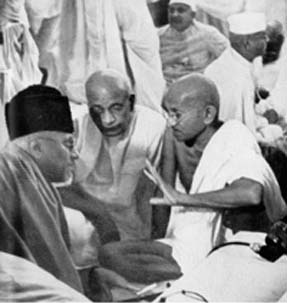 |
This is a file from the Wikimedia Commons. Information from its description page there is shown below.
Commons is a freely licensed media file repository. You can help.
|
move approved by: User:Yann
This image was moved from Image:G95.jpg
| DescriptionGandhi, Patel and Maulana Azad Sept 1940.jpg |
Gandhi in conference with President Maulana Azad and Sardar Patel, A.I.C.C., Bombay, September 1940
|
| Date |
September 1940 |
| Source |
. Originally from en.wikipedia; description page is/was here. |
| Author |
Not listed |
Permission
( Reusing this file) |
PD-INDIA.
|
Licensing
| Public domainPublic domainfalsefalse |
 |
This work is in the public domain in India because its term of copyright has expired.
- The Indian Copyright Act applies in India, to works first published in India.
- According to The Indian Copyright Act, 1957 (Chapter V Section 25), Anonymous works, photographs, cinematographic works, sound recordings, government works, and works of corporate authorship or of international organizations enter the public domain 60 years after the date on which they were first published, counted from the beginning of the following calendar year (ie. as of 2013, works published prior to 1 January 1953 are considered public domain). Posthumous works (other than those above) enter the public domain after 60 years from publication date. Any other kind of work enters the public domain 60 years after the author's death. Text of laws, judicial opinions, and other government reports are free from copyright. Photographs created before 1958 are in the public domain 50 years after creation, as per the Copyright Act 1911.
|
|
|
|
This file may not be in the public domain outside India. The creator and year of publication are essential information and must be provided. See Wikipedia:Public domain and Wikipedia:Copyrights for more details. |
|
|
|
|
File usage
The following pages on Schools Wikipedia link to this image (list may be incomplete):
This file contains additional information, probably added from the digital camera or scanner used to create or digitize it. If the file has been modified from its original state, some details may not fully reflect the modified file.
Wikipedia for Schools was collected by SOS Children. By supporting vulnerable children right through to adulthood, SOS Children makes a lasting difference to the lives of thousands of people. Education is a key part of our work, and our schools provide high-quality teaching to the children in our care. There are many ways to help with SOS Childrens Villages.




